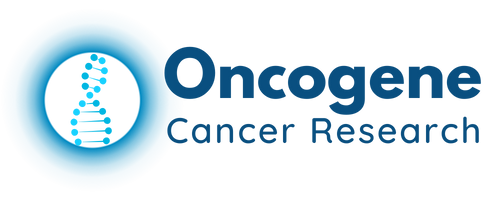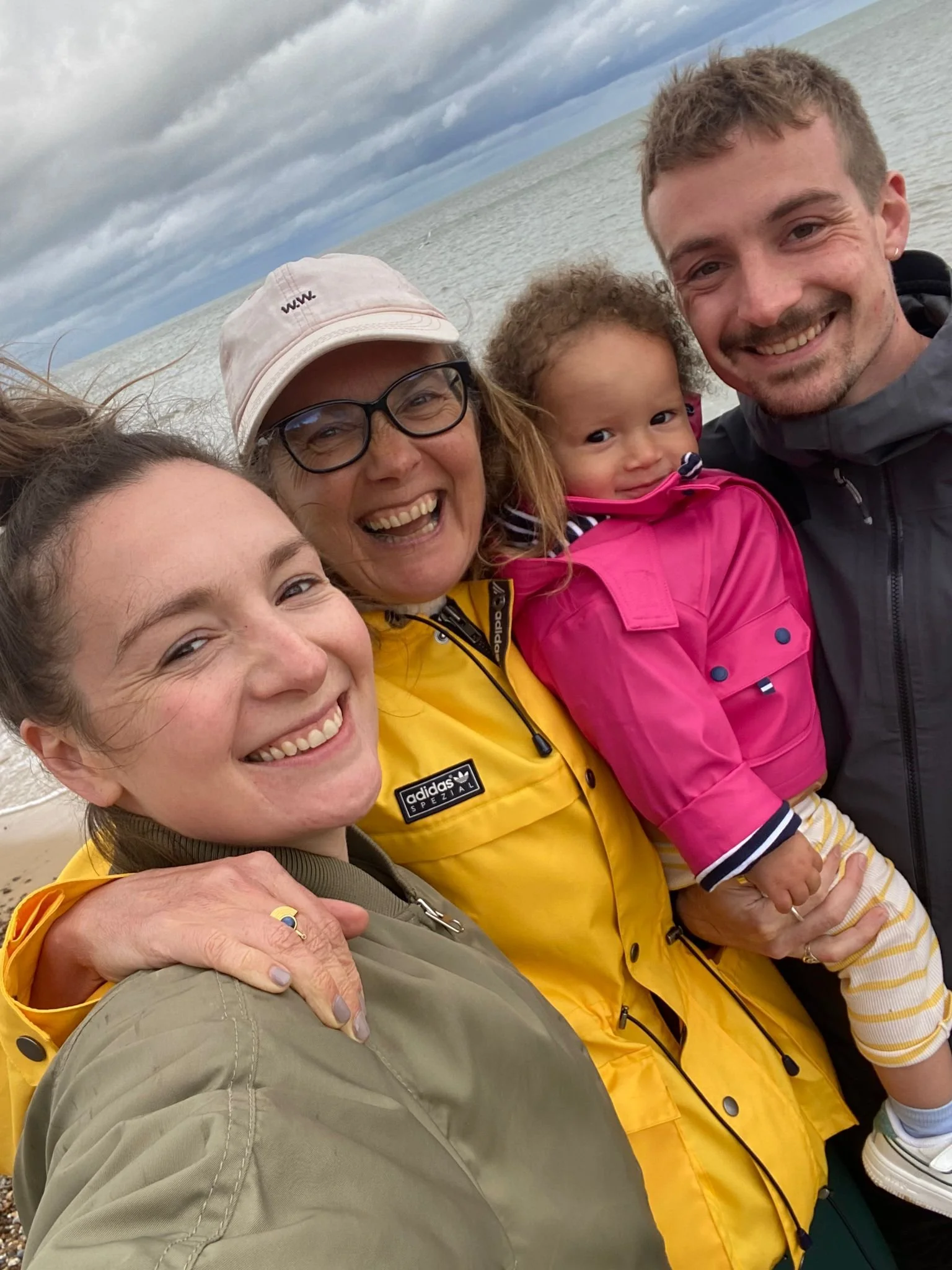Patient stories.

An x-ray for Long Covid may have saved my life. I had no symptoms.
— Mel Erwin (L) and children, Eloise, Fred and George and her granddaughter Maya in Sussex
My “Long Covid” was lung cancer: Mel’s path from diagnosis to advocacy
Mel’s story
The doctor told me he wasn’t expecting to find anything but a CT-scan was a good place to start. He called me the same afternoon to tell me there was a mass on my left lung.
Mel (R), breathing in the good air in Whitstable, Kent with her partner Sarah
Mel, a mother of three who lives with her partner Sarah in East London in the UK, had a successful career as a director of a literacy organisation when she became ill with Covid-19 in April 2020. There was a scary moment when Sarah called an ambulance after Mel collapsed, but two weeks later, she appeared to be back to normal. By June, however, Mel felt another wave of illness.
Mel felt her body was shutting down, that she was grinding to a halt. She had to stop working at the job she loved. Her GP suspected she had long Covid and sent her for an x-ray and blood test at the local hospital.
I remember asking him if it could be related to Covid. He didn’t know. I guess nobody knew the full effects of Covid at this stage. I also asked if it could be cancer. He said yes, it could be.
So, it’s not long Covid?
Mel shares, “The doctor told me he wasn’t expecting to find anything but that it was a good place to start. Yet, he called me the same afternoon to tell me there was a mass on my left lung. I remember sitting on my doorstep alone in the sunshine and asking him if it could be related to Covid. He didn’t know. I guess nobody knew the full effects of Covid at this stage. I also asked if it could be cancer. He said yes, it could be.”
Over July and August, Mel attended a series of scans alone due to the pandemic restrictions and in August, she received a call to say she had a malignant tumour in her left lung. Her world fell apart. Mel had still not seen a doctor face-to-face nor even on Zoom. It felt like a living nightmare. On 7 September, the day after her 53rd birthday, Mel underwent an operation – described as having curative intent – and had half of her left lung removed.
Mel and sons Fred and George - May 2024
Mel reflects and says, “I am not sure how I managed to walk solo through the door of the hospital on the day of surgery. I was annihilated with fear. The only way I could muster the courage was to say my three children’s names on repeat. In fact, I still do this when the darkness hits.”
The hospital experience was hard: many nursing staff had been seconded from the lung cancer wards to the Covid ones. The NHS was struggling, and family members were not allowed to support and comfort her during her stay. It was brutal.
Recovering at home in the sunshine and surrounded by bouquets of flowers, Mel began to feel relief, hope and strength. This was at least until she received another phone call from the same consultant, whom she had still not met, to say the biopsy showed activity in her lymph nodes. Mel was told she needed adjuvant chemotherapy and radiotherapy. Another blow, another shock, another ordeal ahead.
Mel practising yoga at a retreat with her friend Jackie
The power and necessity of lung cancer research
Mel says, “I decided to go for a second opinion, and this was when I first heard about my genetic mutation: EGFR (or Epidermal Growth Factor Receptor – a protein involved in cell division and survival). I saw a consultant in person at a private hospital who explained that being EGFR-positive meant I had specific future treatment options. He mentioned a new drug would soon be available in the UK and if I were to have a recurrence in future, the drug would extend my life considerably. This was my introduction to the power and the necessity of research into cancer treatment.”
Mel doesn’t like to talk about her chemotherapy experience, although she has described this in a prior blog here. Suffice it to say, it was dreadful. Mel says she got through it with Sarah, her cancer angel, at her side. Mel is amazed at how “we can do hard things.” After four months of chemotherapy and one of radiotherapy, Mel began to step back into her life. She started walking 10,000 steps a day and integrating other approaches to physical and mental wellbeing. Mel has a therapist that she could not have got through this without and has been to yoga retreats for people who have experienced or have cancer. Mel has regular acupuncture, and she and Sarah practise qi gong – a coordinated, slow-flow meditative movement. She is involved with three lung cancer charities, has attended a national lung cancer conference and is planning a podcast with a lung cancer nurse specialist on lung cancer and the LGBTQIA+ community.
Mel says, “Everyone handles their diagnosis and treatment differently. For me, I feel sane and happy when I have a balance of pharmaceutical drugs, caring for my body with movement and good food, talking therapy, writing about my experience and sharing it with others, and living a full and joyful life. I crack on with the business of living! I am being normal Mel and yet at the same time I have more awareness and access to the beauty of life than I did before.”
An unexpected move to plan B
Mel with daughter Eloise, son Fred and granddaughter Maya
In April 2022, at a routine scan, multiple small nodules were found on both Mel’s lungs. They were too small to biopsy so were monitored until 2024 when a cancer recurrence was finally confirmed. Mel fell apart for a few days but says she knew a return of the cancer was the probable outcome. The tumours are small and whilst there is no spread to other organs, she is diagnosed as stage 4. She is redefining for herself what stage 4 means. To her, and many in the lung cancer community, it means there is no cure… Yet. She is aware of the advances in lung cancer treatment, including trials of vaccines (although not yet for EGFR lung cancer) and new targeted drug combinations. Apart from fatigue, she feels well, fit, positive and hopeful. Mel stopped working as a director to reduce stress and focus on her role as an advocate and writer. She spends time with Sarah looking after her baby granddaughter (tiring, yes; stressful, no!) and is looking forward to attending more conferences and giving talks on lung cancer.
I want to raise awareness about how essential lung cancer research is for us. I have so much admiration for the world of cancer research. Hope is our rocket fuel.
Living their best lives at a festival - summer 2024
Advocacy is key
For Mel, being an advocate is an essential part of how she deals with her situation. She adds, “I want to spread the word that anyone can get lung cancer regardless of age, smoking history, gender or sexuality. I want people to know the symptoms of lung cancer, not everyone has a cough. I didn’t. And the earlier the cancer is found, the better the outcome.
“I also want to raise awareness about how essential lung cancer research is for us. How we value and need treatments that are less toxic, like the drug that I am now fortunately on. It’s about living well with cancer. I have so much admiration for the world of cancer research. The researchers and clinicians truly care about improving our lives. They show true dedication. Hope is our rocket fuel and as Michelle Obama said recently, hope is making a comeback.”
Mel feels strongly that if people have concerns about their health, they should feel confident about talking to their GP. And to keep talking if the response isn’t adequate. If she hadn’t done this in 2020, her cancer would not have been picked up. Advocating for ourselves is vital.
Find Mel’s writing here.
September 2024








